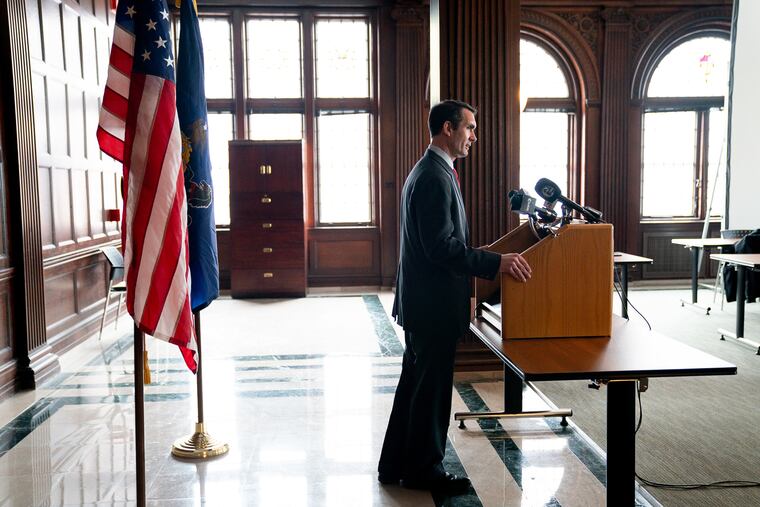Should Pa. dump its Keystone Exams for high school students and save millions? One state official thinks so.
Pennsylvania's Auditor General thinks that the state should replace them with a different test -- such as the SAT or ACT.

Every spring, thousands of Pennsylvania high school students take the Keystone Exams, standardized tests given at public schools in the commonwealth.
The tests come with a hefty price tag: Over the last decade, the state has paid a Minnesota company $425 million for the Keystones and for a second test, the Pennsylvania System of School Assessment (PSSA) exams, administered to third through eighth graders.
Pennsylvania Auditor General Eugene A. DePasquale thinks that the state should scrap the Keystones and replace them “with a different standardized test statistically proven to help students realize their potential for higher education, careers or other callings.”
DePasquale, a Democrat preparing to run for Congress, suggests that Pennsylvania pivot to using the SAT or ACT — the exams accepted or required by many colleges. He was joined at a recent news conference on the topic by State Sen. Andy Dinniman (D., Chester), a longtime critic of the Keystone Exams.
Why lose the Keystones?
For years, the Keystone Exams were mandated by the federal government. The No Child Left Behind law required state-specific standardized tests, but the Every Student Succeeds Act, passed in 2015 to replace No Child Left Behind, requires only exams in math, English, and science. It does not call for state-specific tests.
Pennsylvania at one point was on track to require that students pass the Keystones to graduate, but the state moved in 2018 to give students other ways of demonstrating graduation readiness, such as gaining acceptance to a four-year college, passing AP classes — or earning a satisfactory score on the SAT or ACT.
It’s understandable that Pennsylvania didn’t immediately pivot to using another secondary exam, DePasquale said. But in 2016, it signed a new contract with Data Recognition Corp. that lasts until at least 2021.
Some states are already using the SAT or ACT instead of a state-specific test to meet their federal requirements, but no state has fully met the feds’ requirements for their long-term use. States must demonstrate that any exam is closely aligned with state standards, and that it meets the needs of all learners, including students with special needs.
DePasquale figures the state could save at least $1 million a year if it switched from Keystones to administering the PSAT and SAT to high school students.
Research shows that mandating SAT testing for all high schoolers “increases the rate at which students attend post-secondary education of some kind, particularly lower-income students who might not otherwise realize they could fare well in college," the auditor general noted in a report on the topic.
What do state education officials think?
Matthew Stem, the Pennsylvania Education Department’s deputy secretary for elementary and secondary education, is cooler to the idea of losing the Keystones.
“We are very open to considering the use of other types of high school exams, but we would want to do so thoughtfully and responsibly,” Stem said. “We’ve taken a cautious approach in order to be sure that we don’t move too fast in a way that would be disruptive to our schools and to student learning.”
That is, it’s safe to say that Pennsylvania will be watching closely how other schools that have moved toward the SATs and ACTs for national exams fare with the feds.
The pendulum has swung away from a heavy reliance on standardized testing to define schools. Stem pointed out that under Gov. Tom Wolf, Pennsylvania has shrunk the number of tests students take and pushed back the testing window to better accommodate learning.
“For us at the department, we recognize that Keystone Exams are an important measure of student success and schools’ success, but they aren’t the only measure,” Stem said.
An expert says
Adam Edgerton, a researcher and doctoral student at the University of Pennsylvania’s Graduate School of Education, noted that losing the Keystones in favor of the SAT could have unintended consequences: The SAT tests only math knowledge, writing, and reading.
“That would get rid of science testing, and I think it would reduce the emphasis on science in high school,” Edgerton said. “If you’re not testing something anymore, you’re not measuring it, and you’re not valuing it.”
Students in low-wealth districts — such as Philadelphia and Pittsburgh — typically fare poorer on standardized tests than students in wealthier districts.
And “the SAT and ACT scores are even more correlated with wealth than state tests,” so a move to other high school tests wouldn’t solve for the poverty question, Edgerton said.
Standardized tests can be used in positive and helpful ways, but if the data aren’t being used well, or if districts take a “we’re doing this because we have to” approach, they’re less than ideal, he said.
Still, “you do have to use a test,” Edgerton said. “Whether the SAT or the Keystone is better, I’m not sure.”